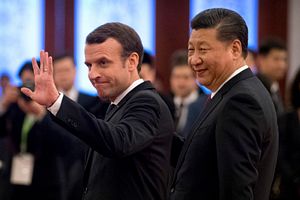During his visit to China from January 8 to 10, 2017, French President Emmanuel Macron declared he wanted France to engage in China’s Belt and Road Initiative (BRI). In an interview given to China.org.cn before his departure, Macron mentioned a Franco-Chinese co-leadership initiative on the environment and called for the construction of Green Silk Roads.
Despite the imbalance between China and France, particularly in the commercial realm, a new relationship may emerge between the two countries, especially through the Belt and Road Initiative, which is sufficiently vague and broad enough to meet the expectations of the many partners of China, including France. The two states have different goals for the development of this relationship and are both taking advantage of the relative withdrawal of the U.S. administration from international affairs.
Through this state visit and his declaration of interest in the BRI, Macron wants to assert himself as the privileged interlocutor of China in the European Union. Macron is at the beginning of his mandate, has a large majority in the French National Assembly, and therefore has a free hand until the next presidential and legislative elections in 2022. France will thus enjoy at least a modicum of political stability for the coming five years, unlike its neighbors. Although Angela Merkel remains German chancellor after winning the September 2017 elections, no government coalition has yet been formed, and her new mandate may be fragile. Italy is preparing for new parliamentary elections in March 2018, the outcome of which could be complicated by a new electoral law. The United Kingdom and Spain are facing problems related to Brexit and Catalonia, respectively. By endorsing the concept of Belt and Road, Macron is trying to present himself as the new leader of Europe.
Beijing may applaud France’s willingness to participate in the Belt and Road initiative. Although the French approach to the new Silk Roads wants to be multilateral, this decision will be seen as an endorsement of China’s policy, which is viewed favorably by Beijing. French membership can lead to similar declarations among members of the European Union and also other states, especially in Africa, and further isolate the United States, which has remained silent on the BRI. Competing regional programs, such as the Asia-Africa Growth Corridor project launched by New Delhi and Tokyo in May 2017, could be undermined by other Belt and Road memberships. Finally, the accession of France and other European states to the Chinese initiative could continue to reassure financial institutions about the economic viability of projects supported by the BRI.
Macron also proposed a Franco-Chinese partnership in the environment and responded to the Green Silk Roads Initiative formulated by Xi Jinping in May 2017. Today, China, the world’s largest polluter, is also the most innovative power in environmental matters. Unlike the United States, China has said it will honor its obligations under the Paris climate accord. With possible cooperation with the European Union on environmental projects, China would strengthen its status as a responsible global power and increase its soft power.
France’s desire to develop environmental projects on the new Silk Roads also has an economic motivation. While Paris would like to sell some solutions in the field of nuclear energy, it also desires to stay in the race for innovation by being an early adopter of the technologies of the future. For Beijing, the BRI is partly linked to the “Made in China 2025” strategy, which aims to boost Chinese innovation and export its standards to the rest of the world. By taking part in the BRI, France is also hoping for new opportunities for its entrepreneurs to be involved in IT and infrastructures projects along the new Silk Roads, which is why French start-ups accompanied Macron on his visit to China.
China obviously does not need France to develop the Belt and Road Initiative, but the recognition of this project by France, which wants to be the new European power, reinforces the already preponderant role of China in international relationships. If the United States remains a privileged partner of Europe in terms of security, China, through the new Silk Road, may become the leading interlocutor for Europe. The fight against global warming is not only a climate issue but also a sector of innovation and a source of jobs for France, Europe, and China. It will now be necessary for France and its European partners to define the modalities of their participation in the BRI and to reiterate their claims regarding open trade. Macron’s decision to go to China once a year testifies to the progress being made in this new relationship.
Dr. Sebastien Goulard works at Cooperans, a public affairs consultancy specializing in governance and Sino-European relations. He also runs the OBOReurope platform.
































